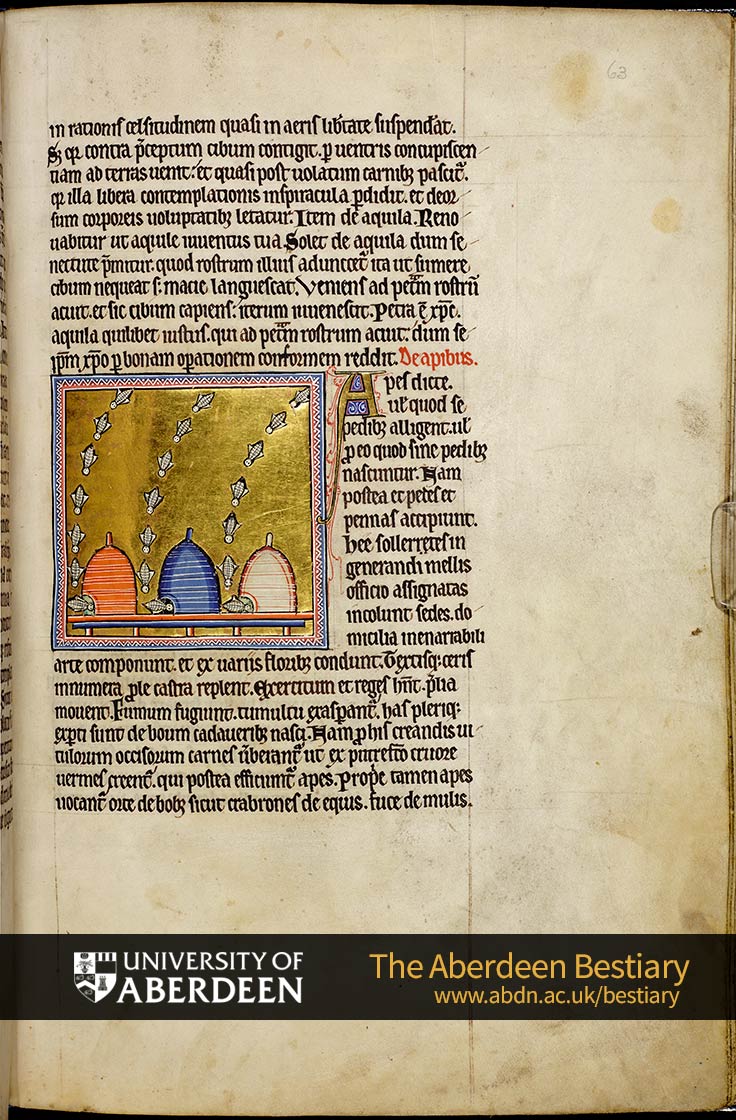Folio 63r - the eagle, continued. De apibus; Of bees
set him him at the height of reason, as if in the freedom of the air. But because, against God's order, he took food, he came down to earth, driven by the longing in his stomach, and now feeds on meat, like the eagle after its flight, because he lost those free air-currents of contemplation, and now takes pleasure, on the ground, in carnal desires.
Again of the eagle. 'Thy youth is renewed like the eagle's' (Psalms, 103: 5). It is usually said of the eagle that, when it suffers from old age, its beak grows hooked so that it cannot eat food but grows weak from under-nourishment. When it comes upon a rock, it sharpens its beak, and taking food once more, regains its youth.
The rock is Christ; the eagle, a righteous man, who sharpens his beak on the rock when he renders himself like Christ through virtuous conduct.
Of bees
Bees, apes, are so called either because they hold on to things with their feet, or because they are born without feet (the Latin word for 'foot' is pes). For afterwards they acquire both feet and wings.
Expert in the task of making honey, they occupy the places assigned to them; they construct their dwelling-places with indescribable skill, and store away honey from a variety of flowers. They fill their fortress, made from a network of wax, with countless offspring.
Bees have an army and kings; they fight battles. They flee from smoke; they are irritated by noise; many are found to have been born from the corpses of oxen. To produce them, you beat the flesh of dead calves, so that worms come forth from the putrefying blood; these later become bees.
Properly speaking, however, only the creatures that come from oxen are called bees; those that come from horses, are hornets; those from mules, drones;
- Commentary
-
Commentary
Text
Bees make honey and skilful hives.
Illustration
The bees, all identical in appearance, zoom into their hives in three orderly rows.
Comment
The design emphasises their collective labours and orderliness. The bees look like a combination of hand grenades and shuttlecocks. They should have a head, thorax and abdomen, and four wings. The skeps or bee hives of coiled straw are accurate except for their fanciful colour. Initial type 2.
Folio Attributes
- Transcription and Translation
-
Transcription
in rationis celsitudinem quasi in aeris libertate suspenderat.\ Sed quia contra preceptum cibum contigit, per ventris concupiscen\ tiam ad terras venit, et quasi post volatum carnibus pascitur, quia illa libera contemplacionis inspiracula perdidit, et deor\ sum corporeis voluptatibus letatur. Item de aquila. Reno\ vabitur ut aquile iuventus tua. Solet [PL, dici] de aquila dum se\ nectute premitur, quod rostrum illius adunccetur ita ut sumere\ cibum nequeat sed macie languescat. Veniens ad petram rostrum\ acuit, et sic cibum capiens, iterum iuvenescit. Petra est Christus, aquila quilibet iustus, qui ad petram rostrum acuit, dum se\ ipsum Christo per bonam operationem conformem reddit. \ De apibus \ Apes dicte,\ vel quod se\ pedibus alligent, vel\ pro eo quod sine pedibus\ nascuntur. Nam\ postea et pedes et\ pennas accipiunt.\ Hee sollertes in\ generandi mellis\ officio assignatas\ incolunt sedes, do\ micilia inenarrabili\ arte componunt, et ex variis floribus condunt. Textisque ceris\ innumera prole castra replent. Exercitum et reges habent, prelia\ movent.\ Fumum fugiunt, tumultu exasperant, has plerique\ experti sunt de boum cadaveribus nasci. Nam pro his creandis vi\ tulorum occisorum carnes verberant ut ex putrefacto cruore\ vermes creentur, qui postea efficiuntur apes. Proprie tamen apes\ vocantur orte de bobus sicut crabrones de equis, fuce de mulis,\Translation
set him him at the height of reason, as if in the freedom of the air. But because, against God's order, he took food, he came down to earth, driven by the longing in his stomach, and now feeds on meat, like the eagle after its flight, because he lost those free air-currents of contemplation, and now takes pleasure, on the ground, in carnal desires. Again of the eagle. 'Thy youth is renewed like the eagle's' (Psalms, 103: 5). It is usually said of the eagle that, when it suffers from old age, its beak grows hooked so that it cannot eat food but grows weak from under-nourishment. When it comes upon a rock, it sharpens its beak, and taking food once more, regains its youth. The rock is Christ; the eagle, a righteous man, who sharpens his beak on the rock when he renders himself like Christ through virtuous conduct. Of bees Bees, apes, are so called either because they hold on to things with their feet, or because they are born without feet (the Latin word for 'foot' is pes). For afterwards they acquire both feet and wings. Expert in the task of making honey, they occupy the places assigned to them; they construct their dwelling-places with indescribable skill, and store away honey from a variety of flowers. They fill their fortress, made from a network of wax, with countless offspring. Bees have an army and kings; they fight battles. They flee from smoke; they are irritated by noise; many are found to have been born from the corpses of oxen. To produce them, you beat the flesh of dead calves, so that worms come forth from the putrefying blood; these later become bees. Properly speaking, however, only the creatures that come from oxen are called bees; those that come from horses, are hornets; those from mules, drones;

